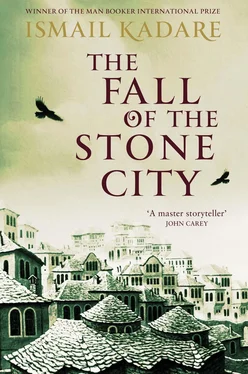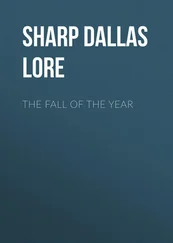One of the investigators broke in to ask if this knowledge had given him the courage to demand the release of the hostages.
Of course, the prisoner replied. He was almost certain that the Germans would ask for the massacre of Borova to be forgotten and promise that such a thing would not happen again.
But what about the release of Jakoel the Jew? How had he been so bold as to ask for this? It was well known that nobody at that time dared ask for the release of a Jew.
The eyes of the investigators and the prisoner met for a moment.
It was a matter of respect for local customs. To the doctor’s knowledge, the Jewish question had been one of the most delicate aspects of the talks. The politicians who were to take over the government of Albania had dug in their heels over the Jews.
“So now you’re singing the praises of the Quislings!” the investigators pounced, speaking together.
“I’m not praising anybody. I know that the communists too insisted that the Jews would not be harmed.”
“We shot these Quislings afterwards,” Shaqo Mezini said. “You know that perfectly well: Father Anton Harapi, Lef Nosi.”
“I know. But not because of the Jews.”
“Go on,” said the investigator.
“Well, the question of Jakoel also had to do with local customs. Besides, Fritz von Schwabe was well acquainted with the Kanun of Lekë Dukagjini , which we had talked about so often. The Jews of Albania and all the Jews who sought refuge here at that time were considered ‘under their hosts’ protection’, and this principle was inviolable.”
Shaqo Mezini leafed through the notes in front him.
The investigators knew everything that had been said at the dinner table that night and asked only one thing. Towards midnight, the dead man, or the supposed Fritz von Schwabe, had said, “You will hear this music differently.” What did this phrase mean?
The prisoner furrowed his brow. In fact he did remember this phrase, and even the smile accompanying it, but he had never known what it meant.
“And those private conversations?” said Shaqo Mezini. “You may not believe it but we know about these too.” He bent down to the prisoner’s right ear to speak softly. “‘I’m not Albania, just as you’re not Germany, Fritz. We’re something else.’ Do you remember saying that?”
“Perhaps.”
“‘We’re something else. . ’ A strange claim, isn’t it?”
Gurameto hesitated. “I remember some of this but these things, about girls we had known and so forth, weren’t important. I remember vaguely. . But amazingly, this man remembered precisely a dream I had told him long ago. In fact when I was becoming suspicious it was this that persuaded me that the man really was Fritz von Schwabe.”
“Go on.”
“I had not told this dream to anyone else. In fact it had no particular meaning. It was a kind of nightmare in which I was lying stretched out on the table being operated on by a surgeon who was my own self.”
“Aha.”
Shaqo Mezini drew close to his ear again. “‘When we were students, we said in the tavern. . but if you are no longer the person you were then.’ Do you remember saying those words, doctor?”
The prisoner shook his head.
“What did you say in that tavern?” the investigator went on. “And why should one of you doubt the other?”
Gurameto shook his head again.
“When someone says, ‘if you are no longer the person you were then,’ I take this as a suspicion that the other person is trying to wriggle out of a duty or agreement.”
The prisoner said he couldn’t remember. Perhaps they’d been talking about old traditions.
Without hurry or irritation, the investigators put more questions, sometimes mentioning the colonel by name and sometimes calling him “the deceased”. What did the deceased say about this, or that? Why did the doctor feel he was on equal terms with the deceased?
The investigators dwelt at great length on this point. “You were a provincial doctor but he was the commander of a tank regiment, and moreover on the victors’ side. Where did this sense of equality come from?”
The prisoner shrugged his shoulders.
“I don’t know. Memories of student days, perhaps.”
“That’s not enough,” Shaqo Mezini said. “I’ll be plain. Who was taking orders from whom?”
“I don’t understand.”
“We were talking about your courage. Where did it come from?”
The investigation had started to go round in circles.
“This courage to ask for the release of the hostages. Where did you find it?”
“I don’t know; perhaps it was because of the dinner.” The prisoner spoke more slowly. “It was due to the reasons you mentioned before, but especially because of the dinner. The invitation seemed the natural thing at the time but later it looked improper.”
“What have I done?” he had said on arriving home. His wife and daughter had wondered too. This dinner would require an explanation. Otherwise he would be reviled as a traitor and shot by his own people. The only justification for the dinner would be the release of the hostages.
Now it struck Gurameto as odd that he was no longer being badgered about that great conspiracy, the “Joint”. And, more lonely and exhausted than ever, he was overcome by a suspicion. How could they know so much? “How did they find out all this?” he repeated to himself.
Like sheet lightning, pictures flashed through his mind of his wife and daughter, their hair in disarray, raped and tortured amidst cries of “Talk!” “Sprich!” No, it was the cave that caused this fear. These were things that not even his wife and daughter could know. So who did?
Fritz, he thought. Alive, in irons like himself, and under interrogation.
The investigators stared at him as he rejected the idea with a shake of his head.
Then it must be someone else. There could be only one answer. Everybody at the dinner had been under surveillance all the time. They were all suspected by both sides.
With vacant eyes he stared at the investigators as if straining to find out from them, but their own eyes were just as blank.
“Bravo! Excellent!”
The delighted investigators were listening to their Russian colleague. Immediately after the session they had gathered in an adjacent cell, which had been turned into an improvised office.
“Ve efferythink know, ha ha ha,” laughed the Russian, trying to pronounce the Albanian words. “You were terrific, boys,” he went on. “Tell me honestly, did you begin to suspect yourselves that Fritz von Schwabe was alive and in our hands and had told us everything that happened?”
They cheerfully admitted that they had almost been persuaded, even though they knew to the contrary.
“So, let me tell you again, he’s dead. Our German colleagues were correct when they told us he died on 11 May in a field hospital in the Ukraine. So, who was ‘the deceased’?”
He asked for a coffee with milk before opening the file in front of him with chubby hands. Sipping the coffee, he drew out a sheaf of photographs from the file. “Here is ‘the deceased’,” he said, pointing to one of them. “Colonel Klaus Hempf, bearer of the Iron Cross. Here he is again, or rather here are the two colonels, the dead one and his ghost, with bandaged heads in a field hospital, in western Ukraine in May 1943. And now here is Klaus Hempf in a place that I think you will recognise.”
They gasped. Colonel Klaus Hempf stood smiling in sunglasses, leaning against an armoured vehicle in the city square of Gjirokastër. The statue of Çerçiz Topulli was visible, as was Remzi Kadare’s house in the background.
“Incredible,” they exclaimed almost in one voice.
“Now, listen carefully,” said the Russian.
Читать дальше












